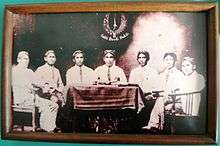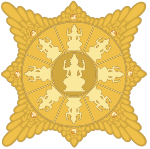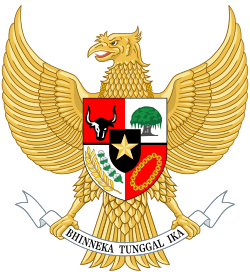Youth Pledge
The Youth Pledge (Indonesian: Sumpah Pemuda) was a declaration made on 28 October 1928 by young Indonesian nationalists in the Second Youth Congress (Indonesian: Kongres Pemuda Kedua). They proclaimed three ideals; one motherland, one nation and one language.[1]
Background

The first Indonesian youth congress was held in Batavia, capital of the then-Dutch East Indies in 1926. It produced no formal decisions but did promote the idea of a united Indonesia. The idea are Indonesian dream of independence become dream of all Indonesian youth and all youth organization empowered efforts to mobilize youth organizations in one forum.[2]
In October 1928, the second Indonesian youth congress was held at three different locations. In the first session held in Katholike jongenlinen bond building, the hope was expressed that the congress would inspire the feeling of unity. The second session saw discussions about educational issues held in Oost Java Bioscoop building . In the third and final session, held at Jalan Kramat Raya No, 106, on 28 October participants heard the future Indonesian national anthem Indonesia Raya by Wage Rudolf Supratman played with violin .
The congress closed with a reading of the youth pledge.[3][4]
The pledge
In Indonesian, with the original spelling, the pledge reads:[3]
Pertama
Kami poetra dan poetri Indonesia, mengakoe bertoempah darah jang satoe, tanah air Indonesia.
Kedoea
Kami poetra dan poetri Indonesia, mengakoe berbangsa jang satoe, bangsa Indonesia.
Ketiga
Kami poetra dan poetri Indonesia, mendjoendjoeng bahasa persatoean, bahasa Indonesia.
In Indonesian with current spelling:
Pertama
Kami putra dan putri Indonesia, mengaku bertumpah darah yang satu, tanah air Indonesia.
Kedua
Kami putra dan putri Indonesia, mengaku berbangsa yang satu, bangsa Indonesia.
Ketiga
Kami putra dan putri Indonesia, menjunjung bahasa persatuan bahasa Indonesia.
In English:
Firstly
We the sons and daughters of Indonesia, acknowledge one motherland, Indonesia.
Secondly
We the sons and daughters of Indonesia, acknowledge one nation [are one people], the nation of Indonesia.
Thirdly
We the sons and daughters of Indonesia, respect the language of unity, Indonesian.
First Congress of Indonesian Youth
- Chairman: Sugondo Djojopuspito (Perhimpunan pelajar-pelajar indonesia/PPPI id)
- Vice Chairman: R.M. Joko Marsaid (Jong Java)
- Secretary: Mohammad Yamin (Jong Soematranen Bond)
- Treasurer: Amir Sjarifudin (Jong Bataks Bond)
- Aide I: Johan Mohammad Cai (Jong Islamieten Bond)
- Aide II: R. Katjasoengkana (Pemoeda Indonesia)
- Aide III: R.C.I. Sendoek (Jong Celebes)
- Aide IV: Johannes Leimena (Jong Ambon)
- Aide V: Mohammad Rochjani Su'ud (Pemoeda Kaoem Betawi)
National Day
As of Presidential Decree No. 316 of 1959 dated December 16, 1959, 28 October became non-holiday national day.[5]
See also
References
- Hudaya Latuconsina & Dedi Rafidi (1996) Pelajaran Sejarah untuk SMU Jilid 2 (History for Senior High School Vol. 2). Penerbit Erlangga, Jakarta, ISBN 979-411-251-8
- Kahin, George McTurnan (1952) Nationalism and Revolution in Indonesia Cornell University Press, ISBN 0-8014-9108-8
- Ricklefs (1982), A History of Modern Indonesia, Macmillan Southeast Asian reprint, ISBN 0-333-24380-3
- Youth Pledge Museum website (Indonesian)
Notes
- Ricklefs (1982) p177
- Pendidikan Pancasila dan Kewarganegaraan kelas 8 (PDF) (in Indonesian). 2. Kementerian Pendidikan dan Kebudayaan. 2017. p. 98. ISBN 978-602-282-960-7.
- "SOEMPAH PEMOEDA". Dec 8, 2009. Archived from the original on January 27, 2012. Retrieved October 15, 2012. Youth Pledge Museum website (Indonesian)
- Hudaya Latuconsina & Dedi Rafidi (1996) p123
- wikisource article about national day that not holiday


